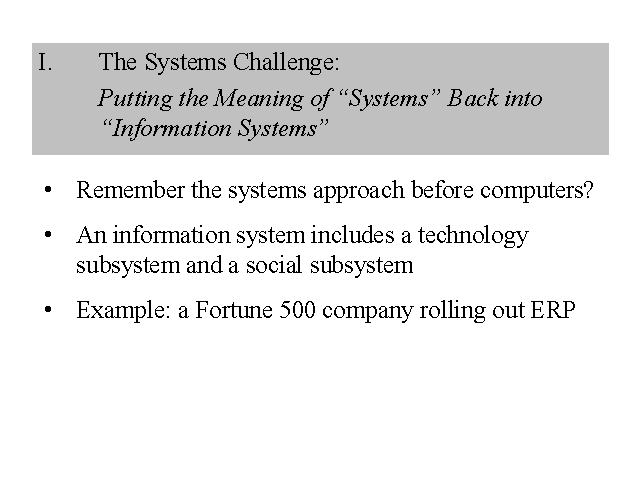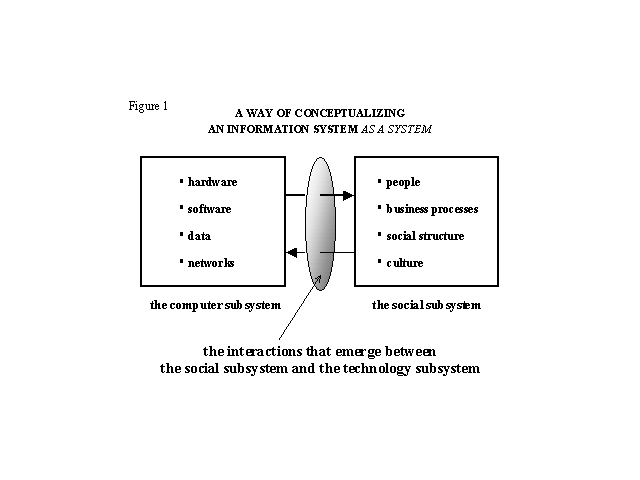  |
 |
  |
 |
I. The Systems Challenge:
Putting the Meaning of "Systems" Back into "Information Systems"
The first challenge - the systems challenge - sounds deceptively simple, but I consider it our pre-eminent challenge.
Although the field of IS has long established itself as a professional and academic field, I find that misconceptions and ignorance about IS are still widespread. I find it hard to look the other way whenever I see someone treating a computer as if a computer itself were an information system. This way of conceptualizing an information system is technocentric, and it's also antithetical to the systems approach, which actually pre-dates computers. The systems approach tells us that any computer is only part of an overall system. Some of the familiar concepts of the systems approach are that a system typically contains subsystems, a subsystem affects other subsystems, a system is more that just the sum of its subsystems, any system is typically a subsystem within a larger system, and so forth. And I emphasize that, in the situation where the system is an information system, the computer is only one of the subsystems. The challenge is to put the original meaning of "systems" back into "information systems." And by the way, this is why I prefer to call our field "information systems" instead of "information technology." All of us pretty much use the two terms interchangeably, but the term "information systems" reminds us that we are, after all, dealing with a system.
There are multiple valid ways to conceptualize what an information system is, and they all involve more than just the computer alone. I turn your attention to Figure 1. In my framing of what an information system is, it includes more than just the computer subsystem (which, in turn has its own subsystems of hardware, software, data, and networks). An information system also includes the social subsystem (which, in turn, has its own subsystems of people, business processes, social structure, and culture). And then, you have the often unpredictable dynamics that emerge when the computer subsystem and the social subsystem begin to interact. IS scholars have known about this for a long time; and, long ago, they already established one or another form of what you see in Figure 1 - such as Gordon Davis's classic textbook, Management Information Systems (first published in 1974); Lynne Markus' article, "Power, Politics, and MIS Implementation," published in the Communications of the ACM in 1983; and Bostrom and Heinen's classic article, "MIS Problems and Failures: A Socio-Technical Perspective Part I: The Causes," which appeared in the very first issue of MIS Quarterly, in 1977. These concepts are decades old, so I'm not advocating new concepts. What I am advocating is a return to these concepts and to take them seriously. The challenge facing us is to put the original meaning of the word "systems" back into the phrase "information systems." And by the way, the meaning of the word "systems" is something that our sister field of operations research had forgotten, and unless we want the field of IS to suffer the same fate, we had better move away from the technocentric view that treats a computer as if it were an information system.
Now, maybe what I'm saying is "old hat" to some of us, but "some of us" aren't everyone. For instance, there is what people in industry believe an information system to be. For one example of the technocentric/non-systems view that a computer is an information system, I refer to a Fortune 500 company in the midwestern region of the U.S. where I've recently been attending meetings of senior-level managers involved in their company's roll out of a major ERP software. After I sat through several meetings about their ERP implementation problems, it dawned on me how they see an information system: their theory-in-use of an information system is that it's a box containing hardware and software, and, in this view, what they see as needing to be done is to plug the box in, step back, and see it work. In years past, I had an MBA student who captured this technocentric thinking in a glib phrase; in a class discussion on a Harvard Business school case that I was teaching, she described the company in the case as having an "appliance mentality" - they treated their information system as if it were something you simply buy and then plug in, like a refrigerator or washing machine. And indeed, this explains what the Fortune 500 company with the ERP roll out is doing: their theory-in-use is to treat every implementation problem of their new ERP system as if their ERP were an appliance, like a washing machine, where the trick would be how to correctly "plug" it into this or that part of their company. The executives in this company are treating personnel and business processes as afterthoughts to be retrofitted to a computer, instead of treating people and business processes as inseparable from, and interactive with, the technology in an overall information system. In other words, they aren't treating this problem as a system at all. The senior management in this company has what I call a technology-only - or technocentric - view of what an information system is, and this stereotype is undermining their ERP implementation and their investment of millions of dollars in it.
To sum up, the systems challenge sounds deceptively simple, but that too, is part of the problem. If we hope to manage and study information systems meaningfully, we must meet the challenge of seeing an information system as a system. The alternative would be for our field to suffer the same fate that operations research did.
